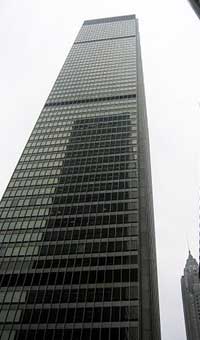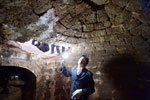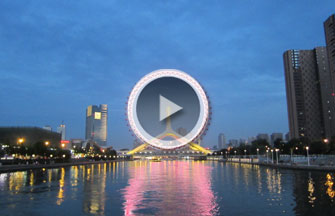China's Fosun buying NY banking landmark for $725 million
Updated: 2013-10-19 05:15
By MICHAEL BARRIS in New York (chinadaily.com.cn)
|
||||||||
A company headed by a Chinese billionaire is paying $725 million for a banking landmark in New York City's financial district, the latest high-profile US real-estate deal by a Chinese business.
Fosun International – the investment firm controlled by Guo Guangchang – will acquire One Chase Manhattan Plaza, the company said Friday. The 60-story, 2.2 million square-foot office tower on a 2.5-acre plaza is the former world headquarters of Chase Manhattan Bank and a signature piece of the city's financial district.
In a statement announcing the acquisition, Shanghai-based Fosun called the property "one of the few high-end landmark office buildings in New York City".
The purchase is the latest acquisition by Chinese property developers looking abroad to diversify amid a slowing economy in China and tight policy measures aimed at cooling an overheated housing market in the country.
|
 One Chase Manhattan Plaza [File photo from Wikipedia] |
Earlier this month, Shanghai-based Greenland Holdings Group agreed to buy a 70 percent interest in an apartment project potentially valued at more than $5 billion in the New York City borough of Brooklyn. In June a group led by Beijing real-estate tycoon Zhang Xin acquired a 40 percent stake in the most expensive US building – the General Motors office tower in midtown Manhattan. The stake purchase reportedly valued at $1.4 billion was seen by many observers as signaling the revitalization of the high-end New York property market after the US economic downturn.
Earlier this month, Shanghai-based Greenland Holdings Group agreed to buy a 70 percent interest in an apartment project potentially valued at more than $5 billion in the New York City borough of Brooklyn.
Built in 1961 with banker, philanthropist and Chase Manhattan Bank chairman and CEO David Rockefeller playing a leading role, One Chase Manhattan Plaza is a visible symbol of wealth and power in the Wall Street area. Although owner JP Morgan Chase & Co moved its headquarters to Park Avenue in 1996, its JPMorgan Chase Bank unit has remained a tenant of One Chase Manhattan Plaza. Fosun said that residency will continue.
For Guo, 46, whose net worth of $3.25 billion ranks him 31st on Forbes magazine's China Rich List, the acquisition is in line with his mission to "help Chinese companies evolve into global players of distinction," according to an interview he gave Shanghai Daily last month.
"Most of the world's best businesses have come to China, and we are on a global stage," he was quoted as saying. "We face global competition, and that's why we need to develop global competitiveness."
Fosun, while publicly listed, is considered China's largest private conglomerate, with about $28 billion in assets. The company, which was set up in 1992 and trades on the Hong Kong stock market, is involved in insurance, industrial operations, investments and asset management. It mainly invests in "sectors that would significantly benefit from China's growth momentum", according to the company website.
For the first six months of the year, Fosun had net profit of 1.69 billion yuan ($274 million) up 9.1 percent from a year earlier.
JPMorgan Chase decided to put One Chase Manhattan Plaza on the auction block after Steve Witkoff made an unsolicited $650 million offer, the New York Times reported. The competing bids for the property were based on converting the office space into condominiums, high-end rental apartments, a luxury hotel or a retail mall, and an office building, the newspaper said.
JPMorgan Chase wants the deal closed by year's end, so that it can focus on its financial and legal woes, according to the Times. In the past month it posted a third-quarter loss of $380 million and agreed to pay $1 billion to settle government probes into last year's trading losses.
The sale also reflects the "struggle" of sustaining office buildings "in the face of the unrelenting demand for residential properties," Eric Deutsch, a former president of the Downtown Alliance, a business group founded by Rockefeller in 1958, was quoted in the Times.
Since the September 11, 2001, terrorist attack on the World Trade Center, the residential population in the Wall Street area has surged 150 percent, the Times reported. Meanwhile, the amount of office space downtown has shrunk 13 percent, as office towers are converted to condominiums.
The deal – and others like it – are reminiscent of Japanese investors who bought iconic US commercial properties in the 1980s and 1990s, including New York's Rockefeller Center and the Pebble Beach golf resort in California.
In February, Chinese property developer Vanke Co agreed to form a $620 million joint venture with Tishman Speyer of the US to develop upscale high-rise condominium towers in San Francisco.
"China has always had the potential to be a major source of capital for real estate globally, and in the last few years we have really seen this market gather pace," said Arthur de Haast, head of the international capital group at property-services firm Jones Lang LaSalle. Chicago-based Jones Lang LaSalle has forecast that global Chinese real-estate investment this year could reach $5 billion.
The GM building stake sale came four days after Shenzhen-based Shuanghui International Holdings said it agreed to acquire US pork producer Smithfield Foods Inc for $4.7 billion. That deal – the largest takeover of a US company by a Chinese buyer – closed last month.
Most Viewed
Editor's Picks

|

|

|

|

|

|
Today's Top News
China has to brace for next dollar drama
Life of Pi artwork on display
Canada welcomes China to invest
No criminal charges in Asiana crash death: DA
US deal key to nabbing fugitives
Trending news across China
Seattle high-tech summit talks 'green'
JPMorgan reaches $13b deal
US Weekly

|

|














